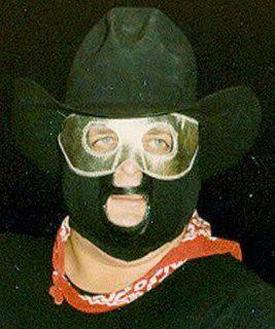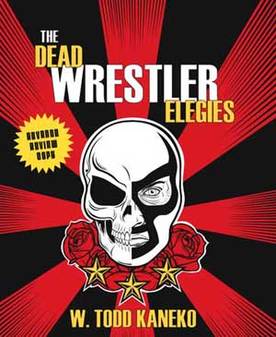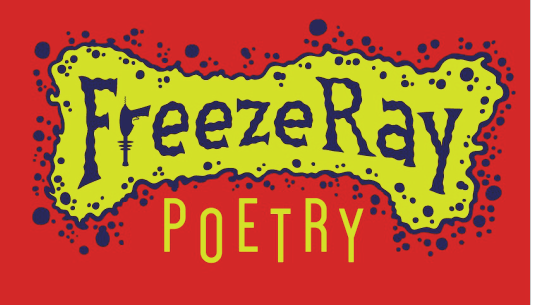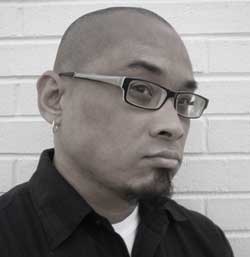5 QUESTIONS with
 Dusty Rhodes as the Midnight Rider
Dusty Rhodes as the Midnight Rider
1.
I’ve read a few poems from Dead Wrestler Elegies and one thing that did stand out for me was how much these wrestlers felt like mythical gods. I also grew up watching wrestling and understand the feeling. I’m wondering what makes these wrestlers seem god-like to you and what it means to write about gods under this lens? Also, what do you think it means to write about gods who are dead?
In his series of lectures called “The Western Tradition,” historian Eugen Weber described the rise of Greek thought in part as the Sophists’ questioning the power of the gods. Basically, Athena was more powerful in Athens than she was in Troy, Poseidon was more powerful in the water than in the mountains, and the Greeks decided that there wasn’t much point to gods whose power is relative and not absolute. This happens as the Greeks move from a Heaven-centric view of the world towards a more earthly one.
I think there is a loose correlation when we look at professional wrestling and the breakdown of kayfabe through the 80s and 90s. At one time, professional wrestling had captured the public’s imagination so fiercely that people in the audience would go after some guys with umbrellas and knives—even threw acid at them. Like the Greeks got fed up with fake gods, many modern sports fans look at wrestling and say that there is no point to sports that are “fake.” But wrestling gives us so many epic stories both in and out of the ring, much the way that the old myths are. For example, there was the time the Freebirds threw hair removal cream into the eyes of Junkyard Dog—JYD missed the birth of his daughter and endured months of public mockery before miraculously regaining his sight and taking revenge on Michael Hayes in a steel cage match at the New Orleans Superdome. Also, there was the time when perennial fan favorite Dusty Rhodes lost a “loser leaves Florida” match to the evil Kevin Sullivan, but then returned wearing a mask and calling himself the Midnight Rider. Everyone knew it was Rhodes under the mask, but Kevin Sullivan couldn’t unmask him despite the bounty hunters he brought in to do the job. When wrestling was at its best, it told great stories, delivering battles between good and evil and exciting our moral compasses to the point of disorientation between what is real and not real.
Also, outside the ring: consider a guy like Sputnik Monroe, a top wrestling star and notorious tough guy during the late 1950s in Memphis. Monroe saw an untapped fanbase in the African-American communities, so he went out of his way to hang out in those neighborhoods, to drink at African-American establishments, and because this was during segregation, he was arrested and fined for doing so. But the result was that Monroe, a heel in Memphis, became so popular among the black population that there wasn’t enough room in the restricted sections of Ellis Auditorium, where the matches were held. Allegedly, Monroe paid off doormen to allow more of his fans in the building, which left promoters little choice but to allow black fans to sit in the white sections, making pro-wrestling the first entertainment venue in Memphis to integrate the audience. Some historians and writers say that this was the first step toward integrating other entertainment venues in the South—sports arenas, night clubs and so on.
Wrestling as we knew it before the 70s and 80s is pretty much dead—it’s something completely different now, more entertainment than sports with the fall of kayfabe, less UFC and more Buffy the Vampire Slayer. Our view of old pro-wrestlers like Gorgeous George and Bruno Sammartino is vastly different now that the public understands the scripted nature of the business. Whether professional wrestling is real or fake to you, the colorful stories of past wrestling heroes and villains are a part of our history and culture as much as are any athletes or public personae, and I think that’s worth keeping alive.
2.
Pop culture is something that is not meant to have lasting qualities and references often get lost in time. How do you think one needs to write about pop culture to make a poem that will last beyond its references?
The ephemeral nature of pop culture makes it a risky thing to include in a poem, or any kind of writing for that matter. I used to have this joke book when I was a kid, and there was this joke that went something like, what did Lancelot say to the Black Knight? I’m stronger than dirt! I didn’t understand that joke because the punchline was just a reference to an old Ajax commercial in the 1960s—the joke relied too much on the reference to do the work of being funny and I was too young to remember it.
A poem isn’t a joke, but it works in a lot of the same ways as it sets up and pays off—there is a rhetorical set up to make images work in specific and surprising ways as the poem works toward a landing of some kind at the end. At least that’s how poems generally work for me. If a writer is using pop culture references—and I think this is the case in any kind of writing—the reference can’t be doing all the work. It can be contextualized by the surrounding material. It might work as an image outside of the reference. The literal reference can be explained to that the figurative meanings can be better understood. The writer must somehow help the reference to transcend itself and be an organic part of a poem rather than just a reference that the writer expects to do more work than it can.
In that same joke book, there was a joke about filling your car with gas, the punchline being something about putting a tiger in your tank—a reference to the old Exxon slogan. It’s still not a great joke, but there is something funny about tigers in a car’s gas tank outside of the company slogan, so if you don’t know that old slogan, you can at least appreciate the absurdity of the image outside of the reference.
3.
Who is the best Pro Wrestler poet? Leaping Lanny Poffo, Jeff Hardy, John Cena, other?
In professional wrestling, poetry is nearly always a mark of a bad guy, and as such, the poetry isn’t always meant to be good. Lanny Poffo was a heel when he played the Genius and those segments where he recited his rhymey poems were pretty much designed to help us dislike him because he was smart and effeminate. And while Cena’s raps were meant to solidify his status as a babyface, he originally came out as the Doctor of Thuganomics and rapped as a heel, a Vanilla Ice type persona that people hated. Even Hardy’s best work onscreen was during his heel run in TNA as the self-professed anti-christ of wrestling. Of course, he was channeling Raven a lot back then, I think, who was the best of any of those guys—he was so angsty and goth. But overall, if you are hearing something that sounds like poetry in wrestling, you are supposed to dislike it, along with the person reciting it.
For me, however, Dusty Rhodes spouted poetry almost every time he opened his mouth. His “Hard Times” promo (you can find it on YouTube and it’s awesome) is like a piece of performance poetry. Granted, it’s at heart an advertisement, designed to get you to want to see him beat Ric Flair, but Dusty Rhodes had a knack for making the audience care about the condition of the world, and care about him in the process. There are lots of guys who could do this, but it doesn’t get much better than Dusty Rhodes, in my book.
I’ve read a few poems from Dead Wrestler Elegies and one thing that did stand out for me was how much these wrestlers felt like mythical gods. I also grew up watching wrestling and understand the feeling. I’m wondering what makes these wrestlers seem god-like to you and what it means to write about gods under this lens? Also, what do you think it means to write about gods who are dead?
In his series of lectures called “The Western Tradition,” historian Eugen Weber described the rise of Greek thought in part as the Sophists’ questioning the power of the gods. Basically, Athena was more powerful in Athens than she was in Troy, Poseidon was more powerful in the water than in the mountains, and the Greeks decided that there wasn’t much point to gods whose power is relative and not absolute. This happens as the Greeks move from a Heaven-centric view of the world towards a more earthly one.
I think there is a loose correlation when we look at professional wrestling and the breakdown of kayfabe through the 80s and 90s. At one time, professional wrestling had captured the public’s imagination so fiercely that people in the audience would go after some guys with umbrellas and knives—even threw acid at them. Like the Greeks got fed up with fake gods, many modern sports fans look at wrestling and say that there is no point to sports that are “fake.” But wrestling gives us so many epic stories both in and out of the ring, much the way that the old myths are. For example, there was the time the Freebirds threw hair removal cream into the eyes of Junkyard Dog—JYD missed the birth of his daughter and endured months of public mockery before miraculously regaining his sight and taking revenge on Michael Hayes in a steel cage match at the New Orleans Superdome. Also, there was the time when perennial fan favorite Dusty Rhodes lost a “loser leaves Florida” match to the evil Kevin Sullivan, but then returned wearing a mask and calling himself the Midnight Rider. Everyone knew it was Rhodes under the mask, but Kevin Sullivan couldn’t unmask him despite the bounty hunters he brought in to do the job. When wrestling was at its best, it told great stories, delivering battles between good and evil and exciting our moral compasses to the point of disorientation between what is real and not real.
Also, outside the ring: consider a guy like Sputnik Monroe, a top wrestling star and notorious tough guy during the late 1950s in Memphis. Monroe saw an untapped fanbase in the African-American communities, so he went out of his way to hang out in those neighborhoods, to drink at African-American establishments, and because this was during segregation, he was arrested and fined for doing so. But the result was that Monroe, a heel in Memphis, became so popular among the black population that there wasn’t enough room in the restricted sections of Ellis Auditorium, where the matches were held. Allegedly, Monroe paid off doormen to allow more of his fans in the building, which left promoters little choice but to allow black fans to sit in the white sections, making pro-wrestling the first entertainment venue in Memphis to integrate the audience. Some historians and writers say that this was the first step toward integrating other entertainment venues in the South—sports arenas, night clubs and so on.
Wrestling as we knew it before the 70s and 80s is pretty much dead—it’s something completely different now, more entertainment than sports with the fall of kayfabe, less UFC and more Buffy the Vampire Slayer. Our view of old pro-wrestlers like Gorgeous George and Bruno Sammartino is vastly different now that the public understands the scripted nature of the business. Whether professional wrestling is real or fake to you, the colorful stories of past wrestling heroes and villains are a part of our history and culture as much as are any athletes or public personae, and I think that’s worth keeping alive.
2.
Pop culture is something that is not meant to have lasting qualities and references often get lost in time. How do you think one needs to write about pop culture to make a poem that will last beyond its references?
The ephemeral nature of pop culture makes it a risky thing to include in a poem, or any kind of writing for that matter. I used to have this joke book when I was a kid, and there was this joke that went something like, what did Lancelot say to the Black Knight? I’m stronger than dirt! I didn’t understand that joke because the punchline was just a reference to an old Ajax commercial in the 1960s—the joke relied too much on the reference to do the work of being funny and I was too young to remember it.
A poem isn’t a joke, but it works in a lot of the same ways as it sets up and pays off—there is a rhetorical set up to make images work in specific and surprising ways as the poem works toward a landing of some kind at the end. At least that’s how poems generally work for me. If a writer is using pop culture references—and I think this is the case in any kind of writing—the reference can’t be doing all the work. It can be contextualized by the surrounding material. It might work as an image outside of the reference. The literal reference can be explained to that the figurative meanings can be better understood. The writer must somehow help the reference to transcend itself and be an organic part of a poem rather than just a reference that the writer expects to do more work than it can.
In that same joke book, there was a joke about filling your car with gas, the punchline being something about putting a tiger in your tank—a reference to the old Exxon slogan. It’s still not a great joke, but there is something funny about tigers in a car’s gas tank outside of the company slogan, so if you don’t know that old slogan, you can at least appreciate the absurdity of the image outside of the reference.
3.
Who is the best Pro Wrestler poet? Leaping Lanny Poffo, Jeff Hardy, John Cena, other?
In professional wrestling, poetry is nearly always a mark of a bad guy, and as such, the poetry isn’t always meant to be good. Lanny Poffo was a heel when he played the Genius and those segments where he recited his rhymey poems were pretty much designed to help us dislike him because he was smart and effeminate. And while Cena’s raps were meant to solidify his status as a babyface, he originally came out as the Doctor of Thuganomics and rapped as a heel, a Vanilla Ice type persona that people hated. Even Hardy’s best work onscreen was during his heel run in TNA as the self-professed anti-christ of wrestling. Of course, he was channeling Raven a lot back then, I think, who was the best of any of those guys—he was so angsty and goth. But overall, if you are hearing something that sounds like poetry in wrestling, you are supposed to dislike it, along with the person reciting it.
For me, however, Dusty Rhodes spouted poetry almost every time he opened his mouth. His “Hard Times” promo (you can find it on YouTube and it’s awesome) is like a piece of performance poetry. Granted, it’s at heart an advertisement, designed to get you to want to see him beat Ric Flair, but Dusty Rhodes had a knack for making the audience care about the condition of the world, and care about him in the process. There are lots of guys who could do this, but it doesn’t get much better than Dusty Rhodes, in my book.

4.
What is the best poem you’ve ever read that relies heavily on a pop-culture reference?
The first that comes to mind is Matthew Olzmann’s poem “Spock as a Metaphor for the Construction of Race During My Childhood” from his great book Mezzanines. There are lots of pop culture references in that book, and he has a knack for complicating and defamiliarizing those references in surprising ways. I heard him read the Spock poem before I had the book, and I remember being struck by how simple the poem appears to be at first—it announces its trope in the title so you know what it’s about. But instead of dwelling where we expect it to, the poem launches into the impracticality of Star Trek and a moment on the playground where the speaker has this moment of clarity about who he thought he was and who he might really be. Like most of Matthew Olzmann’s poems, it’s really an elegant, bad-ass poem.
5.
I’ve had two big points in my life where I followed wrestling religiously: as a child and during my early twenties. The beginning of internet coverage in wrestling really pushed the companies to “break kayfabe” and start incorporating what was happening behind the scenes into the programming. For me that was exciting because it was different and it was crazy that they were doing this but it also eventually became one of the things that pulled me away from it because the fantastical elements just weren’t there for me anymore. A lot of my friends who still watch have found ways to reconcile with this and still maintain that sense of the fantastic. What keeps you engaged and what keeps you a fan?
As a fan of professional wrestling in nearly all of its different forms, I’m looking for those moments where I can forget to suspend disbelief, those storylines that have me so engaged that I can forget that everything is scripted and that the wrestlers are just playing their parts in the narrative.
It’s the same thing that keeps me engaged with any movie or television show—I have to suspend disbelief in superheroes or high school teachers turned meth kingpins in order to enjoy any of the shows I watch on television. There is no part of me that believes that the Undertaker is an undead biker who wants to be world champion, but I can buy into his character and his supernatural powers like I can buy into Spider-Man fighting Doctor Octopus in Manhattan and being fairly confident that Tobey Maguire doesn't have the proportionate strength of a spider. I think that if you can suspend disbelief, all the fantastical elements that you used to see in wrestling are still there. You just have to want to disbelieve.
The Dead Wrestler Elegies will be available from Curbside Splendor Books October 20, 2014. You can order your copy here.
What is the best poem you’ve ever read that relies heavily on a pop-culture reference?
The first that comes to mind is Matthew Olzmann’s poem “Spock as a Metaphor for the Construction of Race During My Childhood” from his great book Mezzanines. There are lots of pop culture references in that book, and he has a knack for complicating and defamiliarizing those references in surprising ways. I heard him read the Spock poem before I had the book, and I remember being struck by how simple the poem appears to be at first—it announces its trope in the title so you know what it’s about. But instead of dwelling where we expect it to, the poem launches into the impracticality of Star Trek and a moment on the playground where the speaker has this moment of clarity about who he thought he was and who he might really be. Like most of Matthew Olzmann’s poems, it’s really an elegant, bad-ass poem.
5.
I’ve had two big points in my life where I followed wrestling religiously: as a child and during my early twenties. The beginning of internet coverage in wrestling really pushed the companies to “break kayfabe” and start incorporating what was happening behind the scenes into the programming. For me that was exciting because it was different and it was crazy that they were doing this but it also eventually became one of the things that pulled me away from it because the fantastical elements just weren’t there for me anymore. A lot of my friends who still watch have found ways to reconcile with this and still maintain that sense of the fantastic. What keeps you engaged and what keeps you a fan?
As a fan of professional wrestling in nearly all of its different forms, I’m looking for those moments where I can forget to suspend disbelief, those storylines that have me so engaged that I can forget that everything is scripted and that the wrestlers are just playing their parts in the narrative.
It’s the same thing that keeps me engaged with any movie or television show—I have to suspend disbelief in superheroes or high school teachers turned meth kingpins in order to enjoy any of the shows I watch on television. There is no part of me that believes that the Undertaker is an undead biker who wants to be world champion, but I can buy into his character and his supernatural powers like I can buy into Spider-Man fighting Doctor Octopus in Manhattan and being fairly confident that Tobey Maguire doesn't have the proportionate strength of a spider. I think that if you can suspend disbelief, all the fantastical elements that you used to see in wrestling are still there. You just have to want to disbelieve.
The Dead Wrestler Elegies will be available from Curbside Splendor Books October 20, 2014. You can order your copy here.


